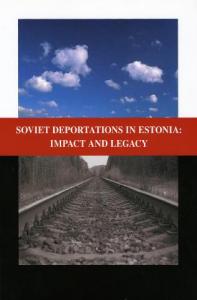
Soviet deportations in Estonia: Impact and legacy (Tartu University Press) brings the stark reality of the June 1941 and March 1949 tragic and brutal events into sharp focus.
Very few families of Estonian heritage have not been grievously affected by the deportations of close or distant relatives, or at the very least, acquaintances.
But the question is still asked: why dwell on the matter almost seventy years after the first wave of deportations? As successor to the Soviet Union, Russia refuses to apologize or acknowledge the enormity of the crime. Russia dismisses the deportations as an aberration of Joseph Stalin’s autocratic era. Moscow shudders at the possibility of victims claiming reparations.
The book, expertly translated into English by Alliki Arro, Madli Puhvel and Lillian Puust, all members of the Estonian academic sorority Filiae Patriae, packs 218 pages of eyewitness “life stories”, well researched material, combined with competently investigated information from archival documents previously unavailable.
Edited by Kristi Kukk and Toivo Raun, this is an essential but also “easy read” book, devoid of typically dry, intimidating scholarly treatises. Both the five heartbreaking personal stories and four well-researched academic accounts engage the reader. One cannot avoid being moved by the will to survive amidst the pervasive evil.
The deportations (in fact a series of deportations starting from 1940 and dwindling off in the mid-fifties) were defining events in modern Estonian as well as Latvian and Lithuanian history.
In current efforts at the European Union, to officially condemn the crimes of communism it’s been noted that the larger constituents of the EU are stalling the process for fear of annoying Russia. Soviet deportations in Estonia makes a compelling case for proceeding with the initiatives.
The book makes us ask once again why communist atrocities should be excused from castigation while Nazi crimes are not?
The book is a modified translation of Eestlaste küüditamine: Mineviku varjud tänases päevas / Deportation of Estonians: Present day shadows of the past, which originated in a conference on the topic of deportations held in 2002 and organized by Filiae Patria in Tartu.
Congratulations should be extended to Filiae Patria’s New York and California chapters, the Estonian-American National Council and the Estonian Cultural Foundation in the USA who sponsored this publication.
The book is available at the Estonian Central Council’s estore in Estonian House, Toronto. Tel: 416 465 2219.ekn@ca.inter.net. estore.ekn.ca.
Advertisement / Reklaam
Advertisement / Reklaam

